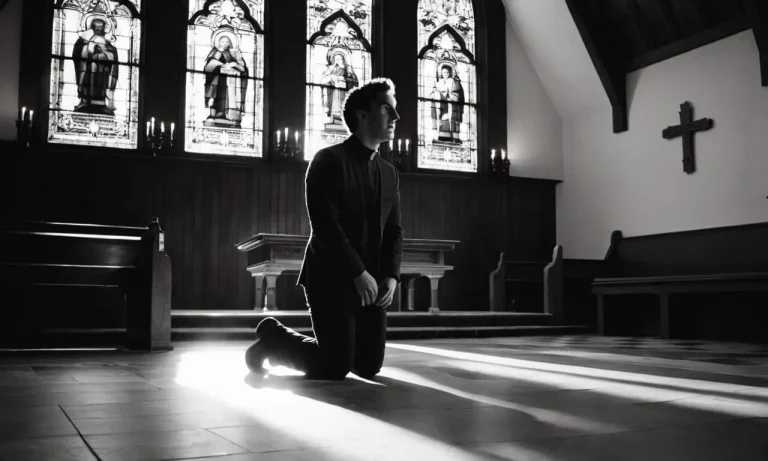Why Do Miscarriages Happen? A Biblical Perspective
Miscarriage is a heartbreaking experience that leaves many grieving parents searching for answers. In times of loss and sorrow, people often look to their faith for comfort and meaning. For those of Christian faith, the Bible can provide wisdom, hope and reassurance as you process your grief after a miscarriage.
If you’re short on time, here’s a quick answer to your question: According to the Bible, miscarriages ultimately result from the fallen, sinful state of the world, but God can bring beauty from ashes and redeem even the most painful losses for His glory.
In this comprehensive article, we will dive deeper into the biblical reasons behind miscarriage and God’s perspective on these tiny lives lost too soon. With compassion and care, we will examine relevant verses, stories, and principles from Scripture to gain insight into God’s heart for you and your precious child.
The Genesis of Death and Suffering
The Entry of Sin and the Curse
According to the biblical account, death and suffering entered the world through the first humans’ disobedience and sin (Genesis 3). When Adam and Eve ate the forbidden fruit in the Garden of Eden, they brought the curse of sin upon humanity and all of creation.
As a result, human relationships were damaged, nature was corrupted, and people became subject to sickness, pain, hardship and ultimately death (Genesis 3:16-19).
The Bible teaches that sin allows decay and disorder to infect God’s originally good creation (Romans 8:20-22). Prior to the Fall in Genesis 3, there was no death or suffering. But once the first couple sinned, not only did they suffer the consequences, but all subsequent generations inherited a world filled with suffering and death as well (Romans 5:12).
This is why we live in a fallen, imperfect world today – one still feeling the effects of humankind’s first rebellion against God.
Living in a Fallen World
As followers of Christ, we currently live in a fallen, imperfect world still plagued by death and suffering even though Jesus has inaugurated the kingdom of God. Christians experience illness, grief, natural disasters and more just like everyone else.
However, we have hope that the curses of Genesis 3 have been decisively broken by Christ’s death and resurrection (Galatians 3:13-14). One day God promises to eradicate all suffering, pain, and crying forever (Revelation 21:4).
Until then, suffering tests and refines our faith if we allow God to work through life’s difficulties (1 Peter 1:6-7; Romans 5:3-5). God often uses pain to draw us closer to Himself, increase our dependence on Him and conform us to be more like Christ.
Additionally, as we suffer we have the opportunity to come alongside others experiencing hardship offering empathy, compassion and the comfort we have received from God (2 Corinthians 1:3-4). So while we groan and lament the presence of suffering now, we can confidently hope for the day when God Himself will wipe every tear from our eyes (Revelation 7:17).
The Role of Human Sin and Brokenness
Consequences of Individual Sin
The Bible teaches that humanity’s sinful nature is a result of the fall of man in the Garden of Eden (Genesis 3). When Adam and Eve disobeyed God, sin entered the world and has had far-reaching consequences ever since. One heartbreaking consequence of sin is miscarriage.
Though not every miscarriage can be linked to a specific sin, the Bible shows there can be connections. For example, substance abuse by a pregnant woman can increase chances of miscarriage. Unhealthy lifestyles and high-stress levels may also make miscarriage more likely.
Even negative emotions like bitterness and unforgiveness have been associated with pregnancy complications.
While we cannot always understand God’s sovereign purposes, scripture urges us to take responsibility for our personal sins. By living in godly ways and bringing our struggles to the Lord, we can avoid possible consequences of individual sin.
Generational Sin and Curses
The Bible also indicates that generational sin and curses can impact generations. Exodus 20:5 states that God “visits the iniquity of the fathers on the children to the third and fourth generations.” Though Jesus’ sacrifice frees us from curses (Galatians 3:13), soul ties may still allow demonic oppression.
For example, heritage of abortion, sexual sin, or ungodly beliefs in a family line may provide legal ground for spiritual attacks. While generational issues are complex, Jesus came to redeem us from curses and destroy the devil’s works (1 John 3:8).
As we repent of ancestral sins, break ungodly ties, and walk in holiness, we close demonic access.
In some cases, miscarriage may be associated with generational sin or curses. Seeking deliverance through spiritual warfare, inner healing, and redemption of family lines can help overcome this link. Though generational factors are difficult to discern, the blood of Jesus has authority to redeem us and break every curse.
God’s Sovereignty Over Life and Death
God Gives and Takes Away
The Bible teaches that God is sovereign over all of life, including matters of life and death like miscarriages. As Job 1:21 says, “The Lord gave and the Lord has taken away; may the name of the Lord be praised.”
Though miscarriages are tragic and often difficult to understand, the Scripture encourages believers to trust in God’s wisdom and timing when it comes to creating and ending life.
Research indicates that 10-20% of known pregnancies end in miscarriage, usually in the first trimester. While in many cases the causes are unknown, problems with the baby’s chromosomes or development can lead a woman’s body to naturally terminate the pregnancy.(Mayo Clinic) Whatever the medical explanation, the Bible still points to God as the ultimate author of life who allows some pregnancies to continue while ending others according to His divine plan.
Working All Things for Good
Even when they cannot understand the reasons, Christians can find comfort in God’s promise in Romans 8:28 to work all things–including pregnancy losses–together for good for those who love Him. While grieving is normal and appropriate, those who suffer miscarriages can be assured that God remains in control and will somehow redeem their loss for a greater purpose.
How might God bring good from a miscarriage? In some cases, He may use it to draw a woman and her spouse closer together or deeper in their reliance upon Christ. The loss of a baby can also make them more compassionate toward others who suffer.
Or it may prevent the birth of a child with severe disabilities or health problems that could have led to greater suffering. Christians affirm that God sees the full picture while our vision is limited.
While miscarriages will likely continue to be a mystery on this side of eternity, Christians can find peace in knowing their lives and children are securely held by a gracious, sovereign God who loves them deeply and promises to work even their most painful losses toward a greater good.
Honoring the Dignity of Life
Human Life Bears God’s Image
The Bible teaches that human beings are created in the image of God and therefore have inherent value and dignity (Genesis 1:26-27). Even though we live in a fallen, broken world, every human life bears the stamp of God’s image and is precious to Him.
Tragically, miscarriages cut short lives that had meaning and purpose, even if only for a brief time. But God sees each tiny life, even if the parents never had a chance to hold their child. As the psalmist said, “For you created my inmost being; you knit me together in my mother’s womb” (Psalm 139:13).
God is personally involved in forming each child.
This truth of being made in God’s image impacts how we view miscarriages. These brief lives still had value and deserve to be treated with dignity. Naming the child and holding a memorial service are ways to honor a life, even if the parents never saw their baby’s face.
Creating memories through photos, footprints and handprints validates the reality of the loss. God sees and knows this child, and so should we.
Even Brief Lives Have Meaning and Purpose
It’s normal to ask why – why did this pregnancy end, what purpose could such a brief life serve? Though we don’t have all the answers, we know God wastes nothing. As Jesus said, “Are not two sparrows sold for a penny?
Yet not one of them will fall to the ground outside your Father’s care” (Matthew 10:29). If God cares for small birds, how much more does He care for the lives of unborn children created in His image?
Though difficult, we can trust God’s good purposes are at work even in the painful loss of miscarriage. Here are some ways these brief lives still have meaning:
- They fulfill God’s purpose in some way we can’t yet see or understand.
- They remind us life is precious and fragile.
- They call us to greater faith and dependence on God.
- They draw us closer to Jesus who also suffered loss.
- They stir us to comfort others with the comfort given to us (2 Corinthians 1:3-4).
A life lived fully in God’s presence, even for moments, has meaning. We can find peace knowing these children are safe with Jesus, awaiting a joyful reunion one day. The brevity of their lives on earth does not negate the significance of their eternal lives in heaven.
They fulfill a part of God’s plan we can only glimpse in part now, but will understand fully one day (1 Corinthians 13:12).
God’s Comfort in Grief
God Weeps With Us
When we suffer the agony of miscarriage or infant loss, God grieves alongside us. As Jesus wept at the tomb of His friend Lazarus (John 11:35), so too does He weep with those mourning pregnancy loss. We take comfort in knowing that our Lord is acquainted with grief and sorrow (Isaiah 53:3).
Though it may not lessen the pain, there is consolation in having a God who understands our anguish.
God promises to be near to the brokenhearted (Psalm 34:18). When we walk through the valley of shadows, He is there to catch every tear (Psalm 56:8). His presence brings strength in weakness (2 Corinthians 12:9). We can cast all anxieties upon Him, knowing He cares deeply for us (1 Peter 5:7).
While the reasons for our suffering may remain a mystery this side of eternity, we trust that God works all things for good (Romans 8:28) and that our current grief is producing in us an eternal glory (2 Corinthians 4:17).
He will one day turn our mourning into dancing (Psalm 30:11) and wipe away every tear (Revelation 21:4). What a glorious day that will be!
Promises of Heaven and Eternal Life
For believers, death does not have the final say. Jesus assured us that little children have guardian angels in heaven beholding the face of God the Father (Matthew 18:10). What amazing comfort to know our babies are safe in the arms of Jesus!
God’s Word offers hope of a glorious reunion with our little ones in heaven one day: “I will see you again and your hearts will rejoice” (John 16:22 NLT). Imagine what joy awaits as we hold our babies and watch them grow in our Father’s perfect home, never to experience pain and suffering again.
Our lives are but a mist (James 4:14), but heaven and our inheritance therein are eternal. As difficult as miscarriage recovery may be, we can endure the temporary sorrow because we know eternity awaits, where all will be made right and beautiful again by our gracious God.
Conclusion
Losing a child to miscarriage is a traumatic event that elicits intense grief and pain. While the Bible does not spell out exact explanations for every miscarriage, it does reveal key truths about God’s perspective on the sanctity of life, the problem of evil and suffering, and His tender compassion for those who mourn.
Ultimately, Christians can find hope in God’s promise to redeem every life and every loss for His glory. Your precious child’s life, however brief, still has profound beauty, meaning and purpose in the eternal plan of your loving Heavenly Father.
As you grieve, He gently whispers “precious in my sight” over you and the little one you carry in your heart. May His Word bring you comfort, wisdom and assurance in your time of sorrow.








